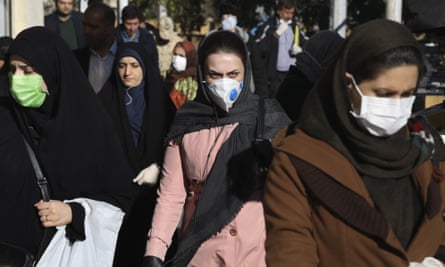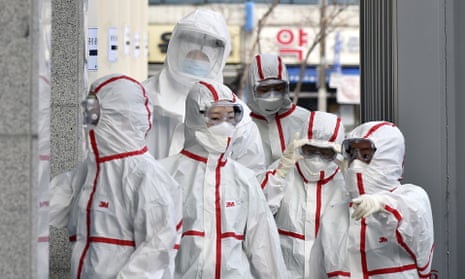South Korea has declared “war” on the coronavirus as cases inside the country approach 5,000 and the World Health Organization chief warns the world is in “uncharted territory”.
South Korea has the most cases of Covid-19 after China and reported 600 new infections on Tuesday, bringing the total number to 4,812. About 75% of the cases are in the south-eastern city of Daegu. The country also recorded a total of 28 deaths, pushing global fatalities over 3,100. Worldwide infections topped 90,000 in more than 60 countries.
President Moon Jae-in said the country was now waging “war” on the virus and the government would inject US$25bn (£19.5bn) into measures to contain it.
“The crisis in Daegu and North Gyeongsang province reached its peak and the whole country has entered a war against the infectious disease,” Moon said, referring to the areas where the outbreak has been the worst.
He ordered all of the government’s organisations to shift to a “24-hour emergency situation room system”.
As South Korea stepped up efforts to contain the virus’s spread, the WHO sent experts to Iran, which has more than 1,500 confirmed infections and 66 deaths from Covid-19 – the highest number of fatalities outside China.
The semi-official Fars news agency said Iran was “accelerating measures” in the fight against the virus, stepping up the production of face masks and sterilising materials. A government spokesperson said efforts were being made to boost production of masks to 1.5m per day, Fars reported.
France, Germany and the UK were among countries that pledged to send emergency medical supplies to Iran. Health authorities there said teams would be deployed on Tuesday to go house-to-house checking on residents and disinfecting streets.
The WHO chief, Tedros Adhanom Ghebreyesus, said at a briefing in Geneva on Monday that the outbreaks in Iran, South Korea, Italy, and Japan were the most worrying.
“We are in uncharted territory with Covid-19,” he said. “We have never before seen a respiratory pathogen that is capable of community transmission, but which can also be contained with the right measures.

“But containment of Covid-19 is feasible and must remain the top priority for all countries. With early, aggressive measures, countries can stop transmission and save lives.”
Other developments included:
China reported 125 new cases on Tuesday, its slowest daily increase in six weeks (eight times as many cases were recorded outside of China as inside in the last 24 hours).
Italy, Europe’s worst-hit country, recorded a spike in the number of deaths to 52 from 18 as the number of confirmed cases reached 1,835.
Health officials in the US, where 91 cases have been confirmed, said six people in the Seattle area of Washington state have died of Covid-19.
Washington has 18 confirmed cases, the most of any state in the US, eight of which have been linked to a nursing home in Seattle.
Donald Trump signalled he was considering additional travel restrictions into America to try to contain the spread of the coronavirus.
Hong Kong’s chief executive, Carrie Lam, said on Tuesday that two chartered flights would bring 533 Hong Kong residents, including pregnant women and cancer patients, back from Wuhan.
The Australian prime minister warned against panic buying, as the central bank cut interest rates to a historically low 0.5% in an attempt to protect the economy.
Cruise ship passengers at Réunion island were threatened by violent protests.
UK supermarkets draw up plans to “feed the nation”.
In China, cities tightened restrictions on travellers coming from overseas. Chen Bei, the deputy secretary general of the Beijing municipal government, said on Tuesday that foreigners and Chinese nationals coming from South Korea, Iran, Japan and Italy must be quarantined for 14 days. Travellers can be quarantined at home or at a government-approved quarantine facility. Shanghai and Guangdong province have announced similar measures.
Wu Qian, a spokesman for the ministry of national defence, said the government had decided to include biosecurity as part of the national security system and would speed up the drafting of a new biosafety law.
“This epidemic has highlighted the importance of biosecurity,” he said, according to the state-run China Daily. “China will speed up the process of building the legal and support apparatus for national biosecurity.”
Chinese authorities asked overseas-based citizens to reconsider or minimise their travel plans as the epidemic spreads across the world, triggering a rise in the number of imported cases arriving in the country.
“We are trying to distance ourselves from the virus, but what cannot be broken is the flesh and blood relationships between overseas Chinese and their families in their home towns,” said the government of Qingtian county in the south-eastern Zhejiang province.
